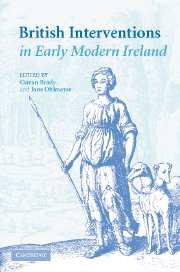Book contents
- Frontmatter
- Contents
- Notes on contributors
- Acknowledgements
- Aidan Clarke: an appreciation
- Conventions
- List of abbreviations
- 1 Making good: New perspectives on the English in early modern Ireland
- 2 The attainder of Shane O'Neill, Sir Henry Sidney and the problems of Tudor state-building in Ireland
- 3 Dynamics of regional development: processes of assimilation and division in the marchland of south-east Ulster in late medieval and early modern Ireland
- 4 The ‘common good’ and the university in an age of confessional conflict
- 5 The construction of argument: Henry Fitzsimon, John Rider and religious controversy in Dublin, 1599–1614
- 6 The Bible and the bawn: an Ulster planter inventorised
- 7 ‘That Bugbear Arminianism’: Archbishop Laud and Trinity College, Dublin
- 8 The Irish peers, political power and parliament, 1640–1641
- 9 The Irish elections of 1640–1641
- 10 Catholic Confederates and the constitutional relationship between Ireland and England, 1641–1649
- 11 Protestant churchmen and the Confederate Wars
- 12 The crisis of the Spanish and the Stuart monarchies in the mid-seventeenth century: local problems or global problems?
- 13 Settlement, transplantation and expulsion: a comparative study of the placement of peoples
- 14 Interests in Ireland: the ‘fanatic zeal and irregular ambition’ of Richard Lawrence
- 15 Temple's fate: reading The Irish Rebellion in late seventeenth-century Ireland
- 16 Conquest versus consent as the basis of the English title to Ireland in William Molyneux's Case of Ireland … Stated (1698)
- Principal publications of Aidan Clarke
- Index
15 - Temple's fate: reading The Irish Rebellion in late seventeenth-century Ireland
Published online by Cambridge University Press: 31 July 2009
- Frontmatter
- Contents
- Notes on contributors
- Acknowledgements
- Aidan Clarke: an appreciation
- Conventions
- List of abbreviations
- 1 Making good: New perspectives on the English in early modern Ireland
- 2 The attainder of Shane O'Neill, Sir Henry Sidney and the problems of Tudor state-building in Ireland
- 3 Dynamics of regional development: processes of assimilation and division in the marchland of south-east Ulster in late medieval and early modern Ireland
- 4 The ‘common good’ and the university in an age of confessional conflict
- 5 The construction of argument: Henry Fitzsimon, John Rider and religious controversy in Dublin, 1599–1614
- 6 The Bible and the bawn: an Ulster planter inventorised
- 7 ‘That Bugbear Arminianism’: Archbishop Laud and Trinity College, Dublin
- 8 The Irish peers, political power and parliament, 1640–1641
- 9 The Irish elections of 1640–1641
- 10 Catholic Confederates and the constitutional relationship between Ireland and England, 1641–1649
- 11 Protestant churchmen and the Confederate Wars
- 12 The crisis of the Spanish and the Stuart monarchies in the mid-seventeenth century: local problems or global problems?
- 13 Settlement, transplantation and expulsion: a comparative study of the placement of peoples
- 14 Interests in Ireland: the ‘fanatic zeal and irregular ambition’ of Richard Lawrence
- 15 Temple's fate: reading The Irish Rebellion in late seventeenth-century Ireland
- 16 Conquest versus consent as the basis of the English title to Ireland in William Molyneux's Case of Ireland … Stated (1698)
- Principal publications of Aidan Clarke
- Index
Summary
In the late 1670s the Bristol ship Diligence made regular trips to north-west Ireland. It was only one of a small flotilla of ships from Bristol which forayed in the late seventeenth century to the apparently isolated ports of Killybegs and Sligo. These ships carried a range of goods essential to the survival of those who lived at the edge of Europe. The hold of the Diligence contained bottles, window glass, gunpowder, lead, leather, sugar, hops, drinking glasses and wool cards. Other ships bound for Sligo and Killybegs in the 1670s had molasses, oil seed, tobacco, madder, logwood, figs, tobacco pipes, bellows, shot and brass manufactures. The contents of the holds of these ships contained a wide range of materials, but the cargo which most had in common was books, ranging in quantity from 14 lb to a hundredweight. This brief glimpse of the trade of some of the remote parts of north-west Ireland is a reminder that in the late seventeenth century the inhabitants of even the more distant areas of Ireland found themselves drawn into a world in which the printed word was a commonplace. Fed initially by imports from Chester and Bristol, the demand for books by the end of the century was more frequently met by the output of a reinvigorated Dublin press. As contemporaries became more confident in handling this great outpouring of print, their attitudes to their world were increasingly moulded by it, and in turn they shaped the texts with which they came into contact by reading them in a variety of ways.
- Type
- Chapter
- Information
- British Interventions in Early Modern Ireland , pp. 315 - 333Publisher: Cambridge University PressPrint publication year: 2005
- 3
- Cited by



